It was only just a few days ago that I was poking fun of twitchers in Alan’s post about White-throated Robins and such. The Gods of Birding, being both capricious and wrathful, decided to punish my insolence by washing up an Emperor Penguin on the coasts of the island upon which I make my home.
This was not initially a problem for me. I first saw it on Sharon’s Facebook page (well, actually her Birdchick blog page on Facebook, I’m not actually cool enough to be friends friends with her on Facebook), and saw that the location was given as being “Western shores of North Island” which I took to mean somewhere around Taranaki, several hours to the north. Safe in the knowledge that I wouldn’t be expected to bother the poor thing I went about my business. But then I saw a photo of it by a friend of mine I knew was in town, which could only mean one thing… it wasn’t far away! I checked again, actually putting the location, Peka Peka Beach, into Google, and found the wretched thing was just north of Paraparaumu, an hour away from Wellington.
Now I was worried. A friend of mine had texted me earlier in the week, saying I could borrow her car for a few days, so I had the means to get there and actually even some time to go and have a look. At which point most birdy readers are probably going “what the hell is the matter with you?” to which I can only say “I don’t really like twitching”. Non-birders are probably just confused, so I’ll spend a second explaining what twitching is. Any given area has a general set of birds you might expect to see in it. Sometimes birds from other areas get lost and end up in these areas, where they are called vagrants. Twitchers are people who make an effort to see as many vagrants as possible, sometimes travelling great distances in order to do so.
Which I guess if it makes you happy is all well and good. It simply doesn’t appeal to me. I’d rather see a bird where it belongs. Twitching seems to go hand in hand with listing, listing in the sense of caring about the number of birds you’ve seen in an country/state. Which again is all well and good, but not really that interesting to me. I couldn’t tell you how many birds I’ve seen in New Zealand. I couldn’t even narrow down to the nearest hundred how many birds I’ve seen period. I keep lists, but actually I’m pretty sloppy about it. And twitchable birds are generally lost souls with little hope of survival. It’s actually kind of sad. So when a rare bird washes up nearby I rarely make any effort to see it, unless it is somewhere I would go anyway.
Which brings us back to the Emperor Penguin. A big part of me really didn’t want to go see it. But the thing was news. Big news. “Made it into the international news” big. I guess it must have been a slow news day. And it also occurs that had I not gone to see it and Corey and Mike had found out I would have gotten 10,000 demerits and lost my position as beat writer for New Zealand. Besides, it’s an Emperor Penguin. That’s like one million times as cool as some small LBJ thingie. So I went to see it.
The weather was foul, unlike the previous day when all the film crews had been there. I guess that’s appropriate, an Emperor Penguin in blazing sun wouldn’t be right. Rain and wind isn’t quite an Antarctic whiteout that would make it feel home, but it felt like it. I was actually kind of worried I wouldn’t find it, as there is quite a lot of beach to hunt through, but the position was unmistakable when I turned a corner and saw loads of parked cars. I quickly fell in with a local who I chatted with as we walked down to the beach. The locals have been pretty magnificent, organising a watch in order to keep people back away from the bird and alerting dog walkers to keep their pets under control. And then, there it was.
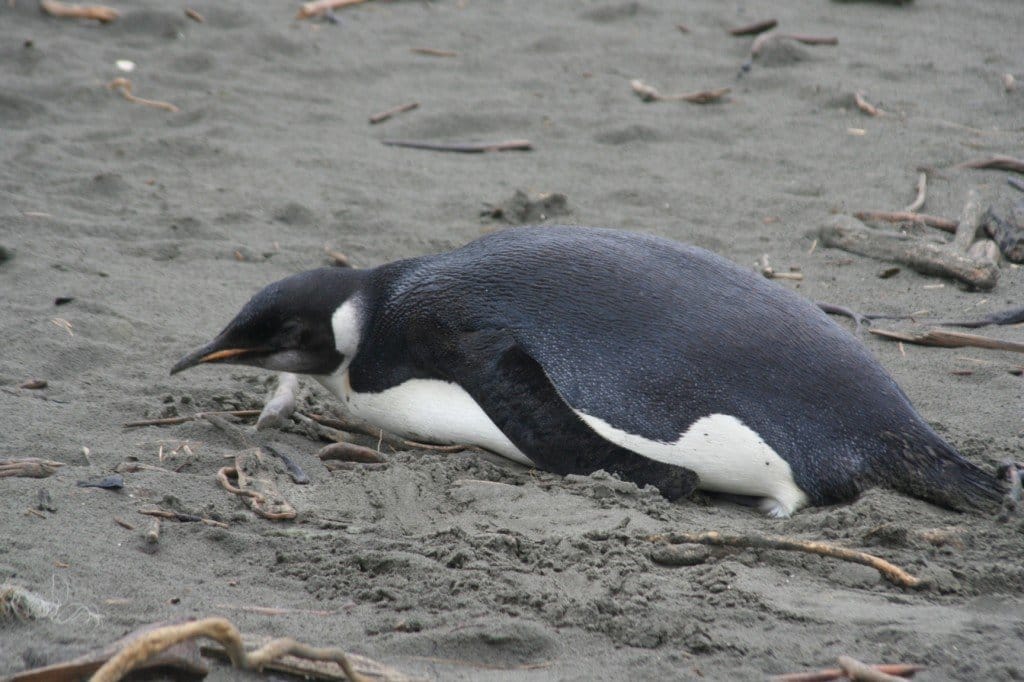 Emperor Penguin (Aptenodytes forsteri)
Emperor Penguin (Aptenodytes forsteri)
There were quite a few people at the beach, in spite of the driving rain and wind, but apart from myself I think I saw only one other person I’d judge was a birder (I’m going by the size of the optics as a judge here, by the way). I think all the serious birders must have gotten there the day before. There were lots of families with kids, and a van from a local old people’s home, a real cross section of society all intrigued by the visitor.
The penguin itself was resting when I got there, as it did the whole time I was there. I was told that it had been moving earlier, and that it was healthy, but it didn’t look very happy. It basically lay there, shifting occasionally and sometimes opening its eyes and nodding its head. My suspicion that all might not be well was actually confirmed the following day when it was taken to Wellington Zoo in order to remove all the sand it had been swallowing in an effort to cool down (Emperor Penguins will apparently swallow snow in the wild to cool down, a behaviour that doesn’t work as well with sand!).
And, well, that was that. The whole thing confirmed pretty much what I suspected, that twitching was not for me. Any appreciation I had for the coolness of seeing a wild Emperor Penguin was drowned out by the fact that I felt sorry for the poor thing. It looked miserable and lost and unwell. When I think of Emperor Penguins I think of magnificent forms striding across vast icy wildernesses, or brave males huddled in the blackest night, not poor washed up souls mistakenly eating sand on a beach. As if to reinforce the point, on the way back to Wellington I stopped on the coast where I had heard that ten percent of the World’s population of Shore Plover were apparently hanging out behind a fire station. Recently reintroduced to nearby Mana Island, they were apparently wintering on the shore of Plimmerton. If anything the weather was worse, the rain stronger and the wind colder, and the light was terrible, but that was of no concern to the little guys that ran around on the rocks around myself and some other delighted birders. They were everything the penguin wasn’t, where the penguin was almost immobile these guys were perky, running too and fro. They were not lost, they belonged here. And they were not sad, but instead represented optimism, a bird driven from the shores (literally!) of New Zealand making a welcome return. This was birding as I enjoy it.
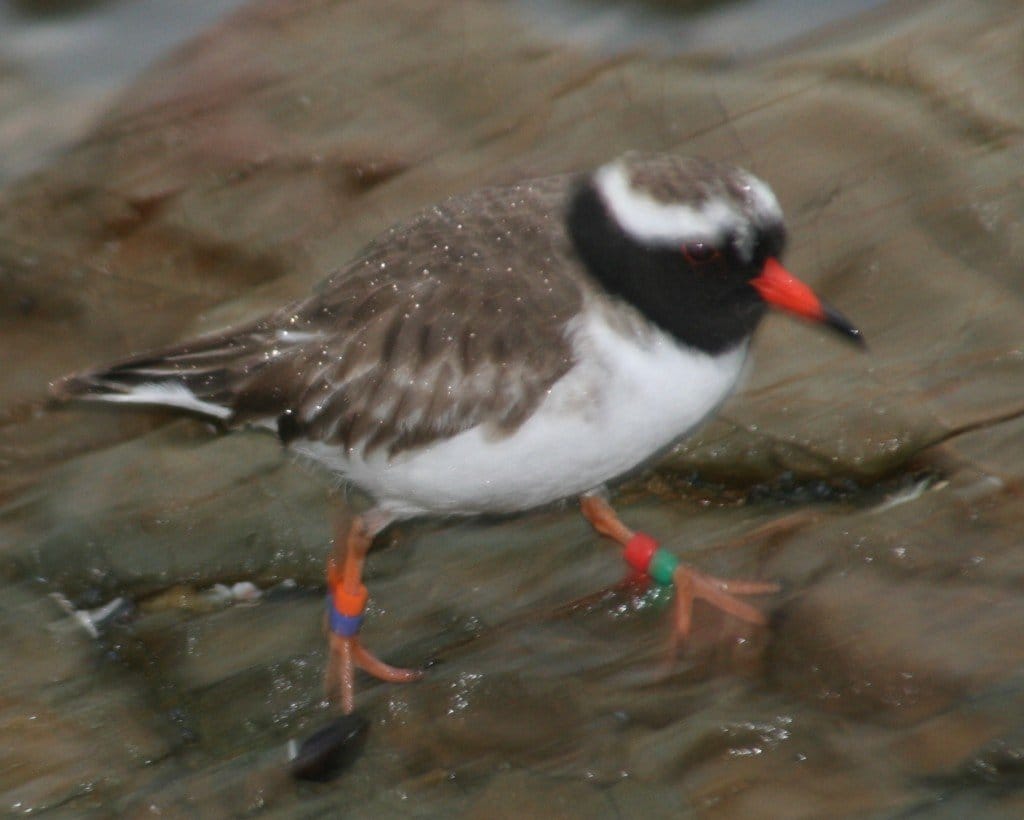 Shore Plover (Thinornis novaseelandiae) running in terrible light. Don’t worry, I’ll be giving these great birds a full post next week, with much better photos.
Shore Plover (Thinornis novaseelandiae) running in terrible light. Don’t worry, I’ll be giving these great birds a full post next week, with much better photos.
One day I’ll make it to the ice sheets of Antarctica and see Emperor Penguins as they are supposed to be where they are supposed to be. And enjoy the experience as much as I enjoyed being with the plovers. In the meantime I’ll leave the twitching to the people who enjoy it.


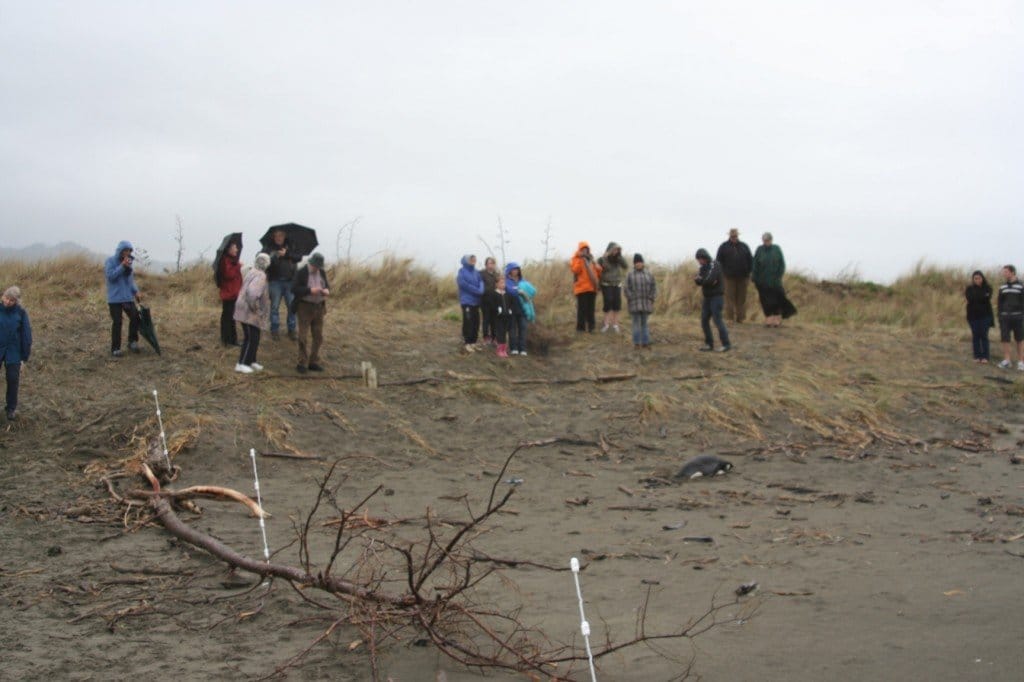
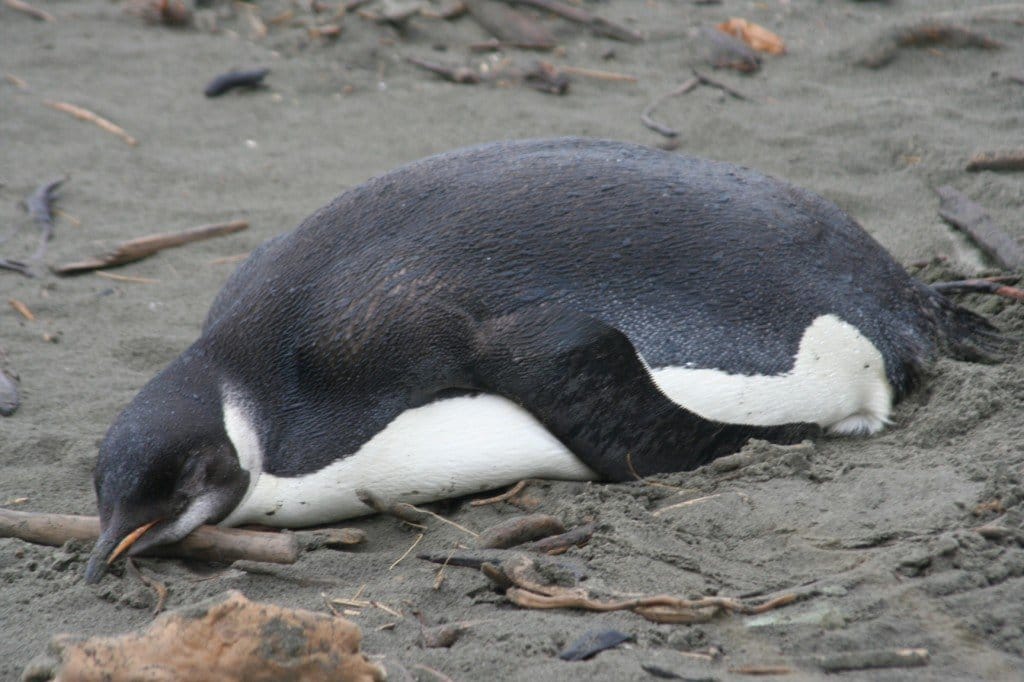





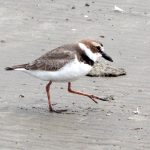
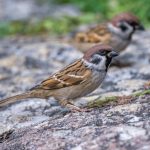





I’m glad to hear someone else doesn’t enjoy twitching. My other birding friends think I’m nuts for not doing twitches. With that said, I’m still glad you got to see that poor penguin. I think I would have gone to see it too. The last time I did a twitch was for a Scott’s oriole, a south Texas bird, unheard of here in Pennsylvania. But really, the bird was less than .25 mile off my normal communiting path. How could I not do it? So I did. This bird seemed happier than that poor penguin, though.
Thanks for a great piece. It’s great to know that not everyone is into twitching and listing. Seeing a bird so far from it’s habitat feels like watching a fish out of water!
I feel the same as you about twitching, Duncan. I’ll take a run at a truly remarkable bird, but would much rather see a species in its particular idiom.
It has been on the news every day here and we feel so sorry for it. We gather it has been offered a lift on an ice-breaker to get home in February and then others said it should have to make it’s own way home-but could it? it got lost once already.
We have some lists, but do not go jumping on planes to twitch birds. Actually Broome gets the twitchers come here as so many vagrants show up-we do go to the Poo Ponds when a Semipalmated Plover shows up, or a Red-throated Pipit on the School oval, though. We are happy with what we see on any day in any place that we happen to be. 🙂
The whole business of what to do about the poor thing is verging into the farcical. It probably won’t be possible to take it back, or even advisable, given the risk of contamination. The kindest thing to do would have been to euthanise it in my mind, but try convincing the public of that. DOC apparently got lots of angry and vitriolic emails when initially leaving the thing be. Never mind it was a wild animal and wild animals die in the wild sometimes. Never mind that DOC has other vitally important things to do, and as of this week has to do them with 100 less employees.
This is a sad twitch and while I am glad you went to take a look (and I probably would have if I were in your shoes too) I almost wonder if this can be considered birding. The penguin reminds of nothing so much as the sad and broken birds that are often left behind in ponds where people feed ducks when the healthy birds fly north to breed.
I like seeing regional rarities and will still be an active twitcher in my area because I think vagrancy is one of the most interesting parts of birding.
Maybe it will be good for people to see the penguin die because it will remind them that we can sure mess up what happens in the environment but we can’t fix everything. Or is that too much to hope for?
Anyway, good job avoiding demerits! 🙂
Great post Duncan!
“Maybe it will be good for people to see the penguin die because it will remind them that we can sure mess up what happens in the environment but we can’t fix everything. Or is that too much to hope for?” First off this isn’t exactly anybody’s fault. It’s just one of those things that happen. And your second point isn’t something to hope for; why would we want people to think that environmental problems are insolvable? That way lies despondency and apathy.
@Duncan: I didn’t phrase what I had to say very clearly, but I didn’t mean to imply that humans caused the penguin to go off course or that environmental solutions are insolvable. People seem to think that anything bad that happens to or in our environment, caused by humans or not, can be fixed with the application of a little science and elbow grease. I think that people remembering that we can’t fix everything is good because maybe then we would be more careful about breaking things.